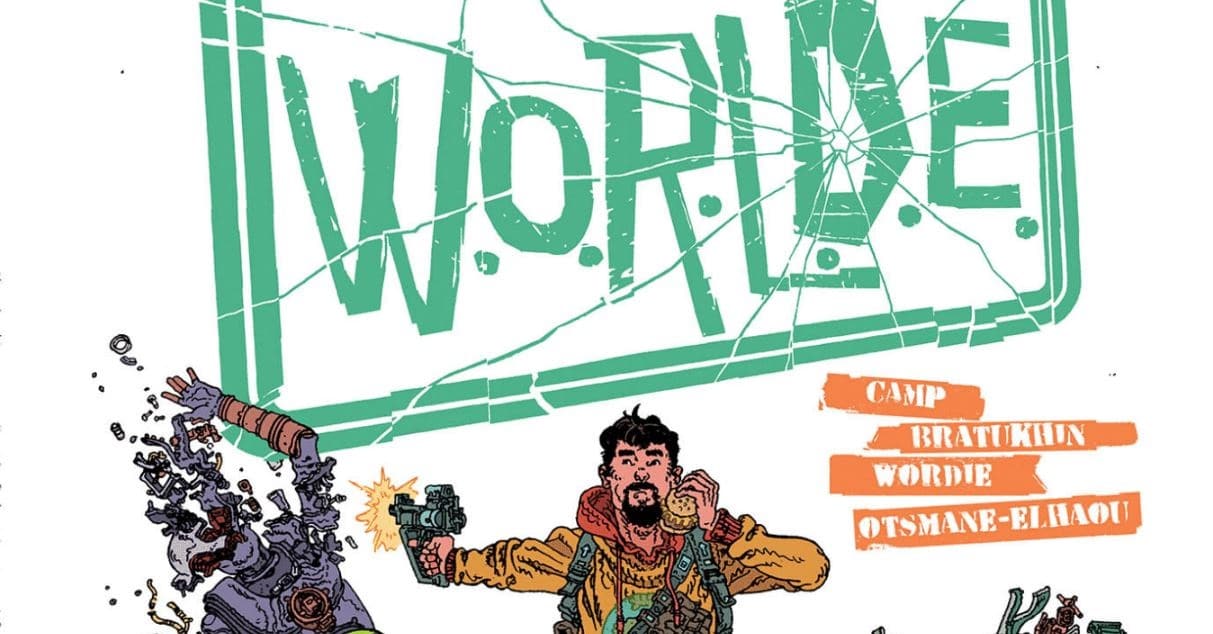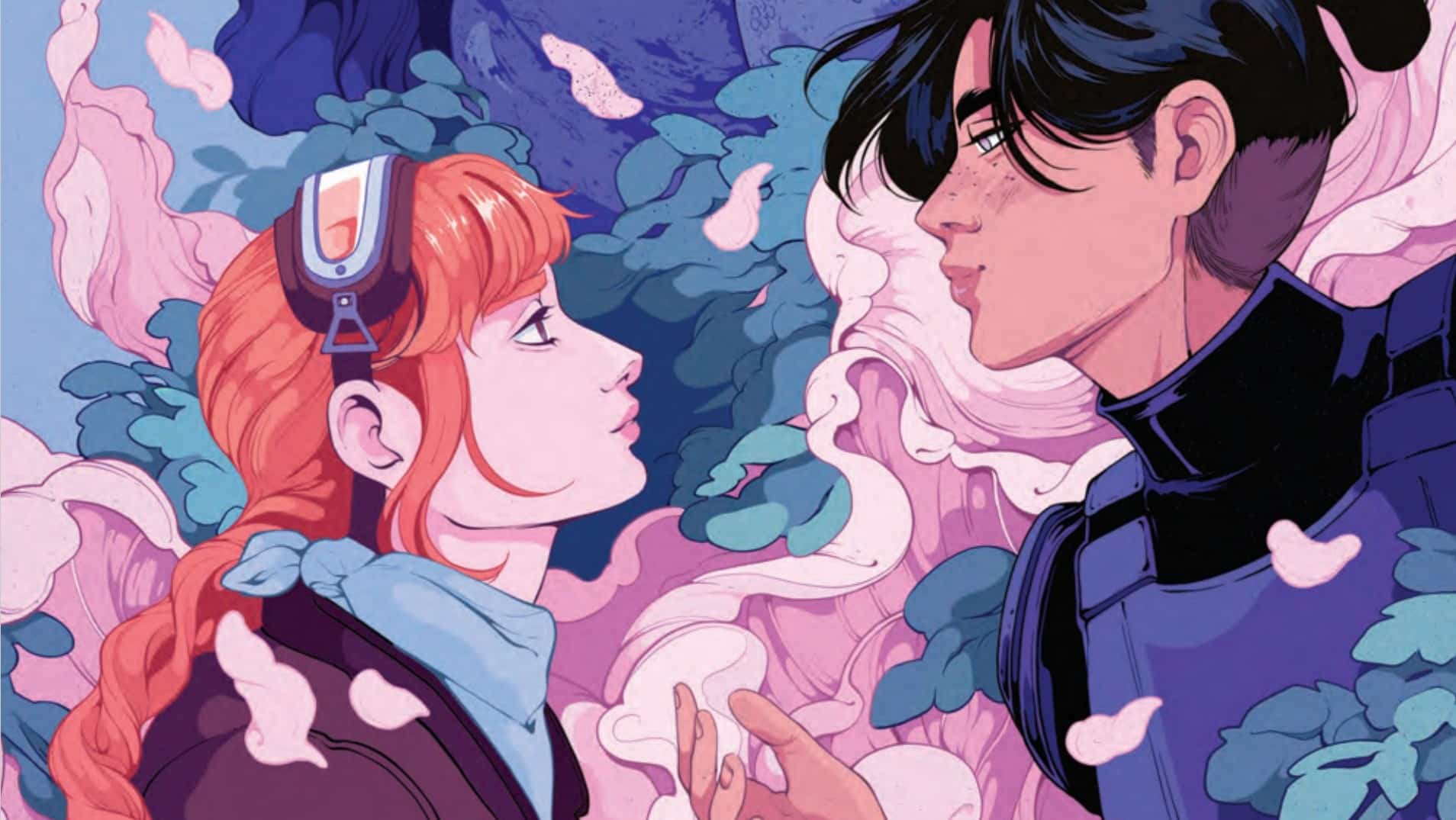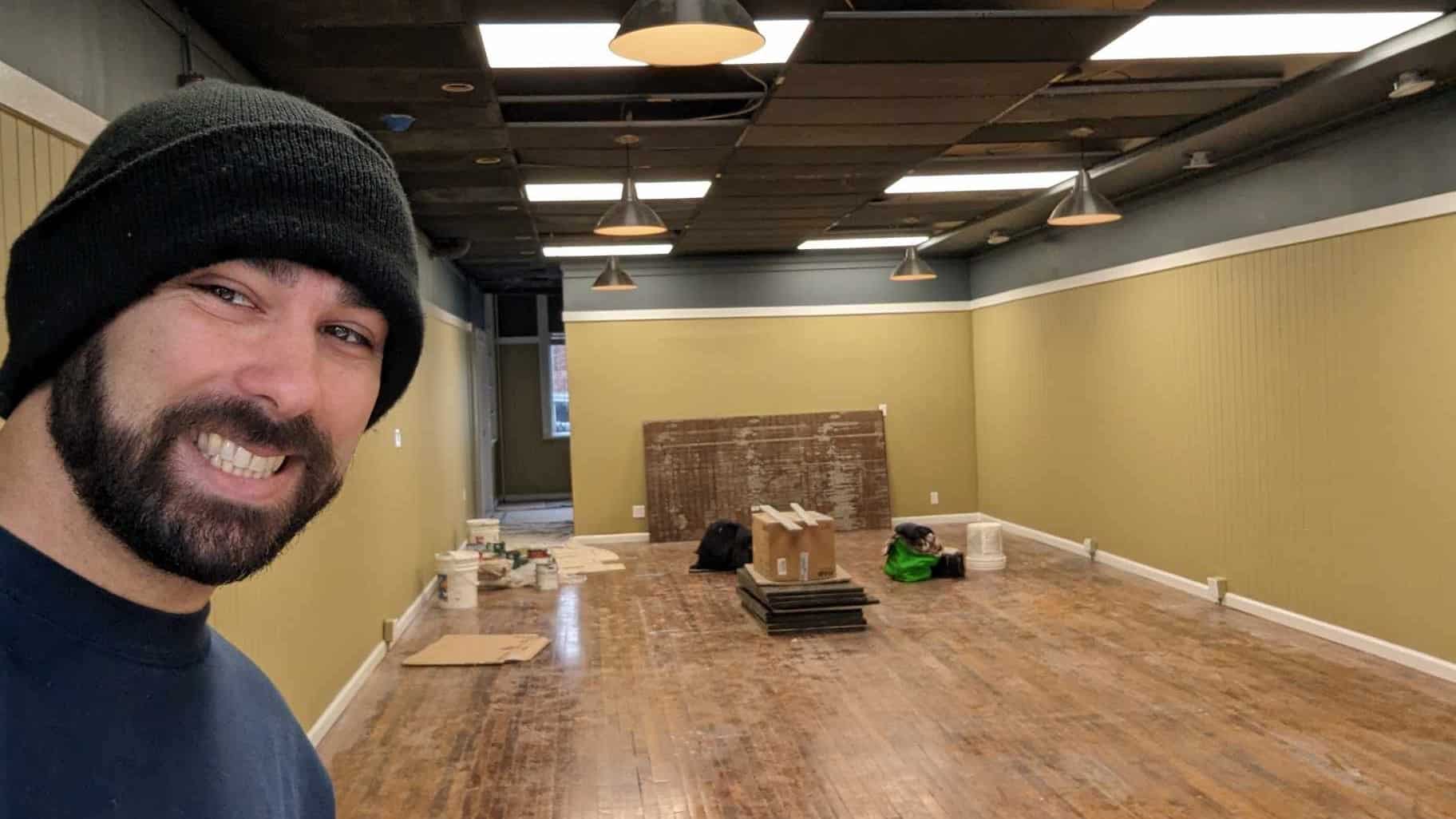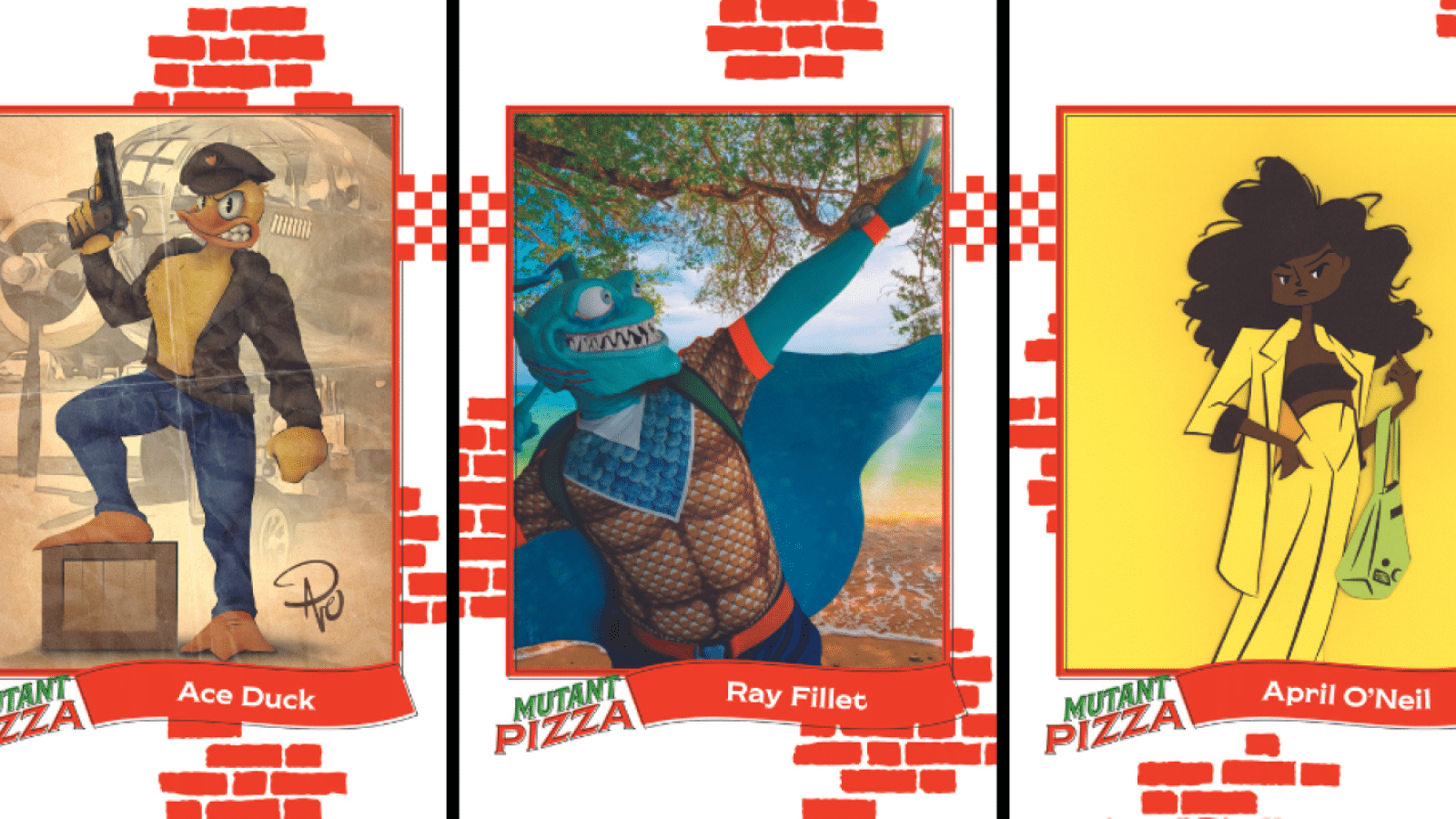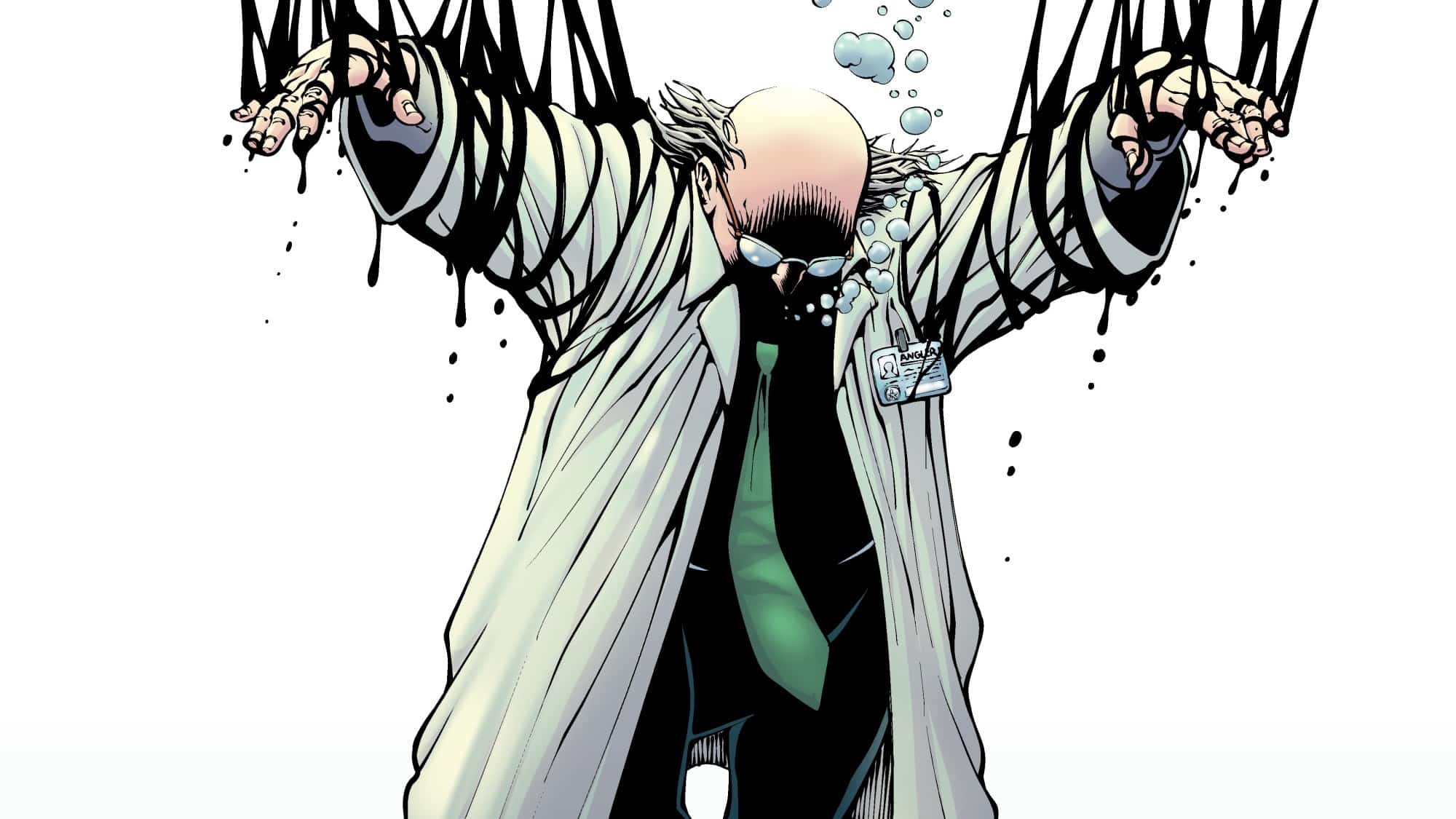From Deniz Camp, Filya Bratukhin, Jason Wordie and Hassan Otsmane-Elhaou, Scout Comics’ Agent of W.O.R.L.D.E. follows special agent Philip Blank, a top operative for the orangutan bosses at W.O.R.L.D.E., as he travels all over the world, time and the multiverse saving it from itself. But Philip isn’t naive enough to think that his bosses have it all figured out, and perhaps there’s more out there. What’s Phillip hiding? I spoke with Camp to find that out and get to the truth behind the creative process of one of the most explosive and visually striking books of the year.
Ari Bard: Maxwell’s Demons, Bloodshot Unleashed, Agent of W.O.R.L.D.E. When looking at these projects you’ve worked on since 2018, the words “uncompromising” and “patient” come to mind. They feel like the type of stories where everyone on the creative team has agreed to let the project take as long as it needs to for everyone involved to be satisfied. All three of these are monumental in scope, and it feels like getting it right feels paramount to getting it out. How does this inform your creative process, from creating the story to assembling the creative team?
Deniz Camp: That’s really kind of you to say. It’s definitely true of Maxwell’s and Agent of W.O.R.L.D.E. Agent of W.O.R.L.D.E. in particular has been about six or seven years of work — I’ve rewritten that first issue at least four times since the initial script, as I’ve changed a lot as a writer. The length of time these things take varies for a lot of reasons. Fundamentally my approach is, I’m trying to give everybody my best self, my best effort. And I can’t do that writing a script in five hours, you know? The way I give you my best self is by thinking about my work deeply, and giving it time. Then putting it on paper, then putting it away, then coming back to and revising, and so forth. Because every time I come back to it I’m a slightly different person; I’ve had some new experience or read some new thing that might feed into it somehow. Sometimes when I sit down to write I’m happy, sometimes I’m sad, or angry, or in pain. The goal of my art is to capture something of the feeling of being alive. And so that means trying, at least, to express a wide range of human emotion. Things are never JUST sad; they’re also funny, touching and wondrous. But it can take time to get that on the page. And that’s just as true of my collaborators. It takes time to draw the way Filya does, I think that’s pretty obvious. And time to color it. It takes time to draw the way Vittorio, Stipan and Jon draw. I understand that comics are often thought of as a disposable medium, but I don’t see them that way. If I’m making disposable work, then I’m wasting my time. It’s the only thing that really scares me about making comics, making disposable work. I put everything I have into my work, and the collaborators I have do too, and that takes the time that it takes.
Ari: On a similar note, all three of these stories operate on a scale where multiverses and extraterrestrial elements exist, and yet you manage to cram all of these ideas into 4-6 issues. How do you reign it in and define the limits once you’ve created a seemingly boundless landscape for your story?
Deniz: I don’t! No, I think it comes back to that human thing we’re all trying to get at. Maxwell’s Demons had a ton of stuff going on, but through it all there was this one guy, growing and changing. Everything was in the service of that — either externalizing it or giving him something to go bounce up against to reveal it. Same with Agent of W.O.R.L.D.E. — that’s a story (in part) about how we see ourselves and how far we’ll go to maintain that fiction. Basically, I try to reveal the infinite with the intimate, and vice versa. It’s all one thing. The big ideas, hopefully they light something up in the reader even in isolation, but to really work they have to be grounded in, or reflective of, the character(s) in some way. That is its own limitation, and a good one. Is this thing just there, or does it serve some purpose? It doesn’t have to be obvious. You don’t even need to be able to articulate it. It just has to “feel” right.
Ari: Moving into Agent of W.O.R.L.D.E. specifically, this is a book where there’s time travel, aliens, robots, pocket universes, magic and more. Every page is a tapestry of ideas you could dissect for hours, but it all feels built on the scaffolding of pervasive, unchecked and largely hostile capitalism. How are you able to pull in ideas from so many different corners of storytelling under one umbrella?
Deniz: Again, very kind. It’s wild and bizarre and out of control and doesn’t seem like it should fit — that’s been my experience of life. Life is absurd, it’s always BEEN absurd, at least since we started remaking it for ourselves. I think we’ve reached an apotheosis of absurdity these days, frankly. Unthinkable things are commonplace now. If aliens came down from the sky we’d shrug our shoulders and go shopping. As to how I do it? It just comes naturally, I guess. The big ideas allow us to talk about universal things in an original, uncommon way. That’s very appealing to me. That’s the whole game! And this is also not just me. This is Filya, the artist, who is always pulling the perspective back to fit more stuff in there. He’s an endless font of creativity, and you can see a whole world going on in the background of our panels. Some of that stuff I call out/suggest, most of it is just him. When I saw that, I sort of started responding to it myself, I guess, and it became a feature of the book. I can’t say enough about how important my collaborators are on this book, and every book I do. They’ve all had a say in it, a huge impact on it that goes beyond just their credits. Everyone who works on this book is a co-owner of this book, and they’ve all given story notes, made suggestions, etc. So if it feels “stuffed,” it’s because there are a lot of people working very hard to make sure every page, every panel is worth your time. Hass hand draws all those lovely, idiosyncratic balloons, together we come up with solutions for language issues, etc. It adds so much.
Ari: Agent of W.O.R.L.D.E.’s tone tows a fine line between an almost “meta” level of self-awareness and a bold, indulgent dose of absurdism. On one hand I’m reminded of a jovial approach to absurdism akin to Plastic Man in the Morrison -> Waid -> Kelly JLA run or the more imaginative strips of Calvin and Hobbes. On the other hand, I’m reminded of serious discussions on the subject by literary essayists such as Camus or Nabokov who share a largely common approach toward the absurd despite very contrasting viewpoints on art and meaning. How are you and Filya using absurdism as a tool in the work to reach a higher level of meaning through detail that while seemingly ridiculous at times, conveys a deliberate point, and not letting it control your creation?
Deniz: I try not to let the absurdity come at the cost of the characters. Something Hassan, our letterer, once said to me when I was starting out writing was, it’s hard enough to get people to believe in and care about your characters without you making a joke at their expense. It’s a kind of an insult to the experience, I think. That really stuck with me. Yes, the world is absurd, and yes, the things the characters are doing are absurd, but our sympathies should always be with them. We have to love them the way they love themselves, even when they hate themselves. Agent of W.O.R.L.D.E., especially, is tongue in cheek a lot of the time, but even characters we only meet for a few pages (I hope) seem to have an interior world. There’s an earnest striving in everyone, even the guy who’s always making silly faces just to get a laugh, you know? Even your cartoonish ape of a boss has someone they love, and maybe long for.

Ari: I suppose in some ways, my previous question can be condensed even further into, the “pretend” really does matter, doesn’t it?
Deniz: Oh, very much so. Pretending is just a kind of high-order thinking. Pretending is the most human thing there is. That’s what makes it interesting fodder for so many great stories (not just ours).
Ari: The grains of truth that often shine through the most within this tapestry of the absurd are largely sobering reflections of capitalism and its interwovenness with militarism. We get the explicit statement that, “It’s always wartime.” Visible human violence may be few and far between due to time travel, redistribution of sovereign nations and non-human soldiers, but there are always people dying from “Killware, armament artists” and the like. I guess this is all to ask, under capitalism the real price is always a matter of human lives, isn’t it?
Deniz: I think that’s never been more clear than now, with a million Americans dead in the name of a strong economy. It’s not that the violence is invisible, it’s that we’re inured to it. We do it and it is done to us, we are victims of it and perpetrators of it and bystanders to it. Then we go home, “another day at the office.” Pretending matters, you said it.
Ari: Another common theme is one of potential, both realized and unrealized. I suppose in Maxwell’s Demons and Bloodshot Unleashed, this theme appears in subtle ways as well. All of these books are about men and how they didn’t have to be the people they were. Along the way there were points where a different decision or two may have prevented them from becoming the possible bad actors that they are in these books. That’s never more apparent than when we read the line, “A child isn’t anything but what they could be.” I think that the ability to display multiple timelines in the same physical space gives the comic medium a unique gift for dissecting the idea of potentials and lives where things might have turned out differently. What makes this theme so special to you?
Deniz: Well, that’s one of the fundamental questions, isn’t it? Who are we, and why are we the way that we are? Comics and sci-fi give us new ways to explore that, a language to imagine alternative ways to live, and I guess that’s part of my project, artistic and personal. To interrogate why I am the way that I am, to look at myself honestly and, if I don’t like what I see, try to change that.
Ari: I feel like we hear all the time from comic creators how important limitations are when creating comics. The whole idea of rectangular panels and nine-panel grids and page counts and boxes really lends the medium to the mindset of sayings like, “Freedom can only be found by first imposing limits on yourself.” We start with limitations so much in this medium, and it feels like your approach here with Agent of W.O.R.L.D.E. and with Maxwell’s Demons is, “Yeah, fuck that” and simply shooting for the moon with no limits. It feels like there are no limitations and things are so big that you are forced to linger on every page and that each panel leaves you with space to interpret and fill things in. There are key actions that explicitly lead your eye across the page, but there are also so many ancillary actions that require thought to fill in the gaps. It’s sequential storytelling with 27 sequences. What makes you lean toward this, I suppose “less common” path?

Deniz: Yeah, I don’t think it’s either/or. Limits have their place; life grows over structures. I did the nine-panel grid in one issue of Maxwell’s Demons and it was really fun and I think turned out pretty well (the grids doubled as tic-tac-toe boards!). I think you just need the right kind of limitations, and an ambition to transcend them. Arbitrary limits can be a great way to inspire creative solutions to things, and limits are a tool. But they’re ONE tool, one way of doing things. Not to hammer the point too hard here, but we’re trying to create a hyper-realized version of life, and life is infinitely deep. There are dramas going on everywhere you look. The ants crawling out of the cracks in my windows (bastards!) are engaged in their own burning saga. I put a bunch of stuff in scripts that never makes it onto the page because I think that “fullness” is felt in some intangible way, even when it goes unseen. Hemingway’s glacier metaphor was correct, I think. I absolutely feel that ambiguity is as important as detail. Maybe more important. The best comics leave room for the reader to insert themselves, their own interpretations, into the narrative. The reader is a member of the creative team, they “complete” the work of art.
Ari: You listed some works from Geof Darrow as a big influence, which I think is very apt. Agent of W.O.R.L.D.E. is also the type of book where every page is an explosion rendered in intricate, mechanical details and every issue is its own adventure in a larger narrative. How many levels are you working on at the same time when talking about panels, pages, issues and the series as a whole? How do you make sure something works on more than one of those levels?
Deniz: Mostly it’s because my favorite comics did that. You mentioned Morrison’s JLA — that was huge for me as a kid, the first comic I really truly loved. And I got different things from their work at 20 than I did at 12. And I like that. I don’t like talking about art this way, but I think that makes it more “valuable” that you can enjoy it in multiple ways, on multiple levels. I make a lot of my comics composed of standalone issues primarily because I want to respect the medium, and the medium is monthly comics. You should be able to pick up an issue, any issue, and get something out of it. I think you should reward people for reading more, not punish them for reading less or coming in late. My recently announced book, 20th Century Men, is more traditionally long form, but each issue DOES feel like a meal, I think; they have their own structures. And that’s the goal. Whether that’s one page, five pages, 25 or 100. I want this stuff to feel full.
Ari: Trying to describe this truly singular style, it feels like an ideal blend of artistry and engineering. It is blocky, mechanical, intricate and just overwhelmingly detailed. So many things are happening in the same space at the same time, but there’s also a lot of inset panels that convey movement through time in the same space. Everything feels so interwoven by the end, how far is everything planned out before Filya really starts working his magic?
Deniz: It really changes depending on the scene. I sometimes give a ton of detail and even draw out how I think it should look. Sometimes he does just that, and sometimes he does something completely different. Sometimes I DON’T give much detail, and he comes back and asks me for more, describing the kind of things that might be going on in the W.O.R.L.D.E. waiting room, stuff like that. It’s extremely fluid. Filya is an astounding creative mind, I think that’s pretty obvious. He makes a lot of choices and adds a lot to every single panel. The book would be literally nothing without him. His work inspired me to write it the way I have, and only he could really pull it off. I think you’re right that Filya was influenced by all those guys, while developing his own voice and taste. And I think that’s the genius of the book — it’s not me, it’s US. Not just FIlya and I. Jason, our colorist, and Hass, also. They’re all heavily represented in these pages, and the book feels fuller for it. The book is visually and textually dense, and it’s because we have four extremely creative people pushing themselves. There’s some stuff in issue #2 that Jason has done with the colors, making certain bits black and white with just one element of color — it takes your breath away. I had nothing to do with that. We inspire each other, and the book is deeper for it.
Ari: When you first started marketing this book a year ago, it was titled C.H.A.O.S. Agent. It seems like things needed to be reworked a bit, and now the book is titled Agent of W.O.R.L.D.E. With the level of detail and the sheer number of choices made in each panel, that already seems like the four-plus years of work that you, Filya, Jason and Hassan put into it. As creators, I’m sure you’ve grown and evolved just as the book has, and I think it’s important not to shy away from revising during a collaborative creative process. How do you revise when the work is this expansive and detailed, and how does it feel to do so?
Deniz: Yeah, I’ve rewritten every issue many times. Issue #1 especially. The bones of the book are the same, of course, but the dialogue has been rewritten many, many times. I find that invigorating and necessary, even when it doesn’t take six years for a book to come out. When the art comes back, I sit down with it and try to forget about the script. There’s a new thing in front of you now, and everything has to be written to fit with, and support, what’s been drawn. The lettering pass is the most crucial part of writing, and a lot can change there. In this case, because it’s been so long, I’ve rewritten EVERYTHING. I’m disgusted by my older work! But that’s what growth looks like. And the bones, I think, were always strong, and the work of my collaborators has always been strong, so that helps. I think you see us grow throughout the book; issue #2 is better than #1, issue #4 is probably the most mature of them (though #2 is still my favorite). We’re already working on a second arc, and the first issue of that will be the best of them all so far. I feel lucky to be growing together with these people.
Ari: Maybe just as important, you changed the title from a five-word acronym to a six-word acronym, with only one overlapping letter. Not only that, between W.O.R.L.D.E, C.H.A.O.S., D.A.N.C.E., O.R.G.S.M., H.O.L.E. and X.O.O. C.R.U., there are acronyms and wordplay galore. How do you do it?
Deniz: Well, as a writer, you know, words are the game and we try to have fun with them. Hopefully the reader has fun with them, too. But language is important to me. I am deeply, deeply in love with language and how it shapes our experience of the world, and I think if you read my work you’ll see that. Language reveals, language obscures, language helps us think and stops us from thinking. It’s all there in Agent of W.O.R.L.D.E. in particular, if you look for it.
Ari: Finally, there’s an especially resonant theme about how once you know how something is made, whether it be food, a piece of art or the multiverse itself, some of the magic is inevitably lost. Now all you can see are the wires holding it together. It seems you and Filya have a pretty good grasp of things when it comes to comics; after all you, Filya, Jason and Hass manage to execute some famous Quitely techniques from We3 and Jupiter’s Legacy with dissolving panels, moving through panels and really using the comics panel itself as a vehicle through time and space rather flawlessly. Is there any enjoyment lost when you’ve come to understand the medium in the way that you have?
Deniz: That’s really nice of you to say, but certainly not flawlessly. In fact, all I can see in my work are the flaws. It can be crushing at times, my inadequacies. I am constantly falling short of my expectations. But that’s OK. I think, actually, that it’s good. Important, even. Because, for me, the only success worth pursuing is artistic success. I want to get better, to keep getting better. Every other kind of success is empty, and out of my control. But getting better? What a thrill! And that’s an endless project. Every time you accomplish something, you see how much more you could accomplish. I’ll never get tired of that, that’s very much the whole point for me. That’s the magic.
Agent of W.O.R.L.D.E. #1 is out June 29 from Scout Comics.
Ari Bard is a huge comic fan studying Mechanical Engineering so he can finally figure out how the Batmobile works.

